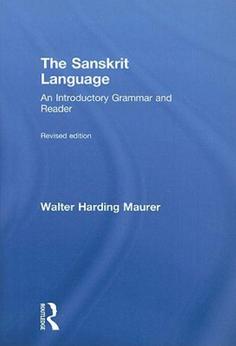Sanskrit is the ancient Indian language in which much of India's traditional literature is written. Knowledge of Sanskrit is essential for anyone who wishes to understand these traditional texts. The grammar of Sanskrit is extremely systematic, but also fairly complex. Structured, guided study is essential for success in learning Sanskrit.
This website is intended to compliment use of the textbook "The Sanskrit Language", by Walter Harding Maurer. Students desiring consistent, long-term study of Sanskrit may find this site a beneficial guide to the textbook. This site contains:
This website is intended to compliment use of the textbook "The Sanskrit Language", by Walter Harding Maurer. Students desiring consistent, long-term study of Sanskrit may find this site a beneficial guide to the textbook. This site contains:
- Answers to exercises
- Helpful hints and corrections to exercises
- Summaries of grammatical topics
- Quick tests of grammatical topics
|
Textbook
"The Sanskrit Language" by Walter Harding Maurer is available from Amazon with free delivery in Canada (Amazon.ca), USA (Amazon.com), and the UK (Amazon.co.uk), as well as from Flipkart with free delivery in India (Flipkart.com). This website is divided into lessons corresponding to the lessons in the book. Each lesson on the website contains a summary of the lesson with additional notes and tips, as well as answers to the exercises in the book. The best way to use this website is the following:
|
Lesson Topics
Introduction: System of Writing, Basics of Grammar
Lesson 1: Nouns and Gender, Principles of Translation, Indeclinable Words, Sandhi
Lesson 2: Verbs, Indefinite Adjective, च, इति
Lesson 3: Prefixes, Gerund, Infinitive, Indeclinables and Case
Lesson 4: Pronouns and तद्
Lesson 5: Verbal Roots, गुण and वृद्धि
Lesson 6: Past Passive Participle, -अर्थम्
Lesson 7: Pronoun Declension, Gerund-PPP Phrases
Lesson 8: Conjugation of कृ
Lesson 9: Middle Voice
Lesson 10: Locative Absolute
Lesson 11: Visarga Sandhi, Principles of Breaking Sandhi
Lesson 12: Compounds, तत्पुरुष, कर्मधारय, Compounds with PPPs
Lesson 13: बहुव्रीहि, Longer Compounds
Lesson 14: Relative Pronoun, Regressive Assimilation Sandhi
Lesson 15: Optative Mood, Vowel Sandhi, Principles of Translation
Lesson 16: Consonant Stems
Lesson 17: Consonant Stems with Two Variants, Present Active Participle, -वत् and -इन्
Lesson 18: Consonant Stems with Three Variants, Negative Compounds, द्वन्द्व Compounds
Lesson 19: Future Tense, Present Passive Participle
Lesson 20: Dual Number, First and Second Person Pronouns
Lesson 21: Perfect Tense, Imperative
Lesson 22: Directional Adjectives
Lesson 23: Nouns Ending in -ऋ
Lesson 24: Combined Devanāgarī Writing, Final -न् Sandhi
Lesson 25: Non-Thematic Verbs, Class V and VIII Verbs, Desiderative
Lesson 26: Class II, III, VII, and IX Verbs
Lesson 27: Metre, Passive Stems, Gerundives, Passive Impersonal
Lesson 28: Causative Verbs, Denominative Verbs, एनद्
Lesson 29: Comparative and Superlative Adjectives
Lesson 30: Aorist Tense, Adverbs
Lesson 31: Primary Derivation, Secondary Derivation
Lesson 32: Numerals, Dating
Introduction: System of Writing, Basics of Grammar
Lesson 1: Nouns and Gender, Principles of Translation, Indeclinable Words, Sandhi
Lesson 2: Verbs, Indefinite Adjective, च, इति
Lesson 3: Prefixes, Gerund, Infinitive, Indeclinables and Case
Lesson 4: Pronouns and तद्
Lesson 5: Verbal Roots, गुण and वृद्धि
Lesson 6: Past Passive Participle, -अर्थम्
Lesson 7: Pronoun Declension, Gerund-PPP Phrases
Lesson 8: Conjugation of कृ
Lesson 9: Middle Voice
Lesson 10: Locative Absolute
Lesson 11: Visarga Sandhi, Principles of Breaking Sandhi
Lesson 12: Compounds, तत्पुरुष, कर्मधारय, Compounds with PPPs
Lesson 13: बहुव्रीहि, Longer Compounds
Lesson 14: Relative Pronoun, Regressive Assimilation Sandhi
Lesson 15: Optative Mood, Vowel Sandhi, Principles of Translation
Lesson 16: Consonant Stems
Lesson 17: Consonant Stems with Two Variants, Present Active Participle, -वत् and -इन्
Lesson 18: Consonant Stems with Three Variants, Negative Compounds, द्वन्द्व Compounds
Lesson 19: Future Tense, Present Passive Participle
Lesson 20: Dual Number, First and Second Person Pronouns
Lesson 21: Perfect Tense, Imperative
Lesson 22: Directional Adjectives
Lesson 23: Nouns Ending in -ऋ
Lesson 24: Combined Devanāgarī Writing, Final -न् Sandhi
Lesson 25: Non-Thematic Verbs, Class V and VIII Verbs, Desiderative
Lesson 26: Class II, III, VII, and IX Verbs
Lesson 27: Metre, Passive Stems, Gerundives, Passive Impersonal
Lesson 28: Causative Verbs, Denominative Verbs, एनद्
Lesson 29: Comparative and Superlative Adjectives
Lesson 30: Aorist Tense, Adverbs
Lesson 31: Primary Derivation, Secondary Derivation
Lesson 32: Numerals, Dating
Have you found this website helpful? Please support its maintenance and improvement

